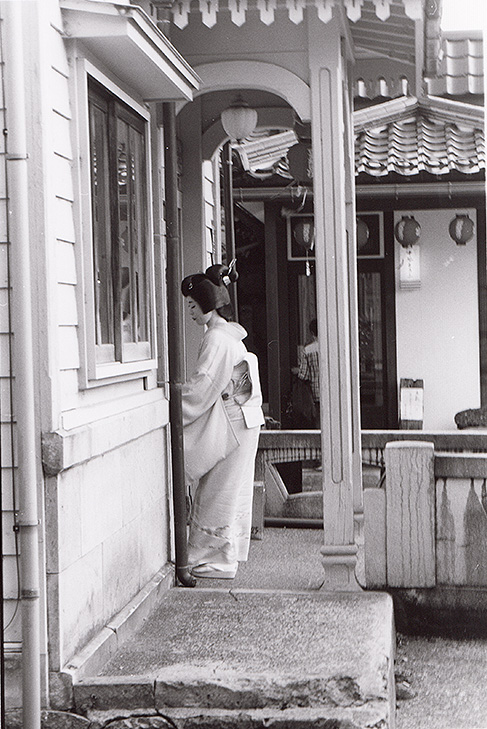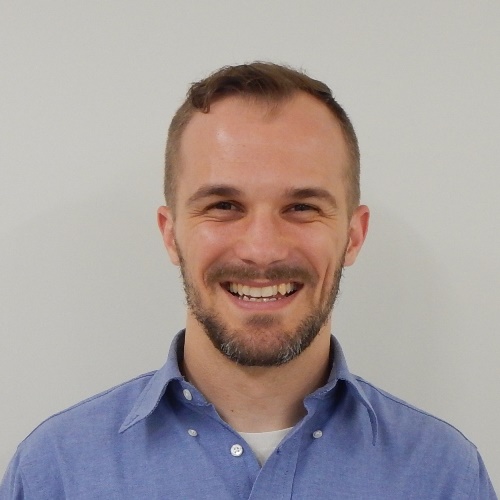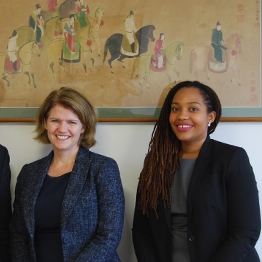KU-GLOCS is the general term referring to various globalization initiatives by Kanazawa University,
including its participation in the Top Global University Project (Super Global Universities).
KU-GLOCS
KU-GLOCS is the general term referring to various globalization initiatives by Kanazawa University,
including its participation in the Top Global University Project (Super Global Universities).
YOU & KU-SGU
"!" and KU-SGU
As Kanazawa University responds to globalization, it introduces a wide range of surprises (!),
unrestricted by existing boundaries.


Faculty of Foreign Language Studies, Institute of Liberal Arts and Science
Associate Professor
Mark HAMMOND
From this academic year, approximately 300 courses of general education were rearranged into 30 “GS General Education Courses” established based on “Kanazawa University ‘Global’ Standard (KUGS).” Also, English courses were reorganized as “GS Language Courses,” which enable students to obtain more practical skills. Last year, Associate Professor Mark Hammond, from America, was assigned to the Faculty of Foreign Language Studies, Institute of Liberal Arts and Science, which is in charge of “GS Language Courses.”
– Could you tell me why did you come to Japan?
My father was an engineer and in the 1980s, he was involved with some projects with a Japanese company in Tokyo. My first image of Japan was through his photos and stories, and that is how I got the idea that I would like to visit someday.
I majored in communications at Duquesne University in Pittsburgh, in America. I was interested in broadcast journalism, and wanted to work in television news. After graduation, I started as a freelance assistant for television shows and commercials and got to meet many creative people who asked me to help on their projects. That is how I become interested in fine-art photography.
In 1992, when I was 26 years old, I saved some money and I finally went to Tokyo because I thought that it would be a great place to photograph. My plan was take photographs and only to stay for a few months. However, after about a week, I found a job with an English conversation school. I thought it would be just a part time job in Tokyo, but they asked me to be the manager of their school in Kanazawa. I had no idea where Kanazawa was, but it seemed like a good chance for me, so I said yes. And, after 24 years, I am still here.
– It is surprising to know that you originally came to Japan to take photographs.
My career path changed when I started teaching English. After a few years in Kanazawa, I got an introduction to a professor at Kanazawa College of Art and I started teaching English there as an adjunct instructor. This gave me a chance to be around creative people again and I had several of my own exhibitions of photography and published a small book of photographs of Kanazawa. I also got very lucky and had one of my photos put into the permanent collection of the Smithsonian American Art Museum in Washington, DC.
I started getting adjunct positions at other schools, including here at Kanazawa University and this inspired me to get a master’s degree in TESOL (teaching English to speakers of other languages) from the University of Birmingham in the UK, which has an international distance learning program offering the same curriculum as their on-campus program. From last year, I started my current full-time position. My main responsibility is teaching the TOEIC and EAP (English for Academic Purposes) courses. I also received a grant from the Japan Society for the Promotion of Science for my research project about English language needs for traditional Japanese craft workshops. So now, I have a chance to link language teaching with creative industries.
– Your various experiences are now linked together. Ok, let’s change the subject and talk about the drastic education reforms started in Kanazawa University this April. The key features of the reforms are “Quarter System” and “GS Courses.” The 2nd quarter has just ended. What do you think about “Quarter System”?
A good point is that it creates more opportunities for students to experience studying abroad, without interfering too much with the Japanese school year. It also gives students more exposure to a variety of teachers and subjects. A far as disadvantages go, maybe eight weeks is not always enough time to really develop rapport between students and teachers, especially if you consider that one or two weeks will probably be used for testing or other assessment. It also doubles the workload of registration and reporting grades, but the faculty and staff are working together to meet the new challenges. Innovation and change is not always easy, but since we just started, I am open-minded and really hope the quarter system is successful.
– What is the difference between “TOEIC Preparation” and “EAP (English for Academic Purposes)” of the new curriculum and “English” of the old curriculum?
The GS Language Courses have more specific learning outcomes than in the past, and all instructors plan their classes based on standard textbooks and syllabi that include specific guidelines for evaluation. This helps to make sure we are working together to reach the goals of the new curriculum. Also, in the TOEIC courses, all instructors use a standard examination, so we have more time to think about how to improve our lesson plans instead of making exam questions.
– What kind of skills do you expect the students to obtain through “TOEIC Preparation” and “EAP”?
The TOEIC courses help students become familiar with the test so that they may get better scores, which is very important for their future. They also strengthen listening, reading, and vocabulary skills, which are all part of general proficiency. The EAP courses focus on fundamental aspects of writing at the university level, and organizing and giving presentations. The EAP courses in the 3rd and 4th quarter will try to go further by integrating these skills to promote critical thinking by comparing contrasting points of view about social issues and academic topics.
– Could you give KU students some hints on how to improve their English skills?
From my point of view, as an English teacher who has taught at several schools, KU students are generally hard-working and do their homework. However, sometimes they are a bit shy to say something in the classroom. I think a little more effort to participate in ‘active learning’ can really help, for example asking questions during class and not after class, or having the confidence to answer the teachers questions even if you make a mistake.
Outside of class, I think it is very important to read in English, for your own pleasure. It can be anything: novels, magazines, news articles, blog posts, comic books. Find something that is just a little harder than your level and keep trying.
– It will be easier to read about something that they like in English than complicated academic topics, so that sounds like a good idea. You know that Kanazawa University strongly encourages our students to go abroad.
I strongly recommend that they go abroad, too. I had a few educational experiences similar to studying abroad, which shaped my opinion and view of the world. The first was when I was in high school. I played rugby, which at that time was a very rare sport for American high schools. Maybe that is why we were invited to an international tournament in England. During our two week tour, I was much more excited to be in a different culture than I was about playing rugby. This experienced turned me into a traveler, and I have been to about 20 countries since. The second experience was when I was in my 30s and I attended a two week photography workshop in Italy. My main purpose was to study photography, but what really changed me was how rewarding it was to make friends by staying in one place for an extended time. Even though I was embarrassed about my really basic Italian language skills, so many people were nice to me because I tried hard to communicate. Because of such a positive experience, I went back to Italy, to the same small town, for the next five summers. It was a really great feeling when many people remembered me.
Neither of these experiences were academic programs. I really wish I had a chance, like Kanazawa University students do now, to participate in an academic program, like the English language programs. However, I think it would be a good idea if KU developed programs featuring extra-curricular activities, for example, a program in which some members of the KU American football team visit a KU partner university in America and interact with the football team there.
– That sounds interesting! Such programs might attract students who are not confident with their English ability.
I also recommend that students watch TV while they are abroad. When I first came to Japan, I watched TV a lot. I used popular jokes I learned from TV to make Japanese people laugh, and this helped start conversation. TV or Youtube can help you be informed about current popular culture and can be used to trigger a conversation, and that is really important when you are trying to make friends.
– Lastly, what do you think is necessary for the students to lead the global society in the future?
I think strong leaders have some similar characteristics. One, they really try hard and stay focused even when things are difficult. They have a vision, and they follow it. Two, they are usually very good listeners and enjoy sharing ideas more than giving orders, which usually means they are positive and friendly. And three, strong leaders treat all people with dignity and respect, no matter what social position they may have. They recognize and thank people who are making a contribution to the organization.
Oh, one more thing. I want KU students to say hello to me when we meet in the corridor or cafeterias. Sometimes I say “Hi!” to the students but they don’t respond, which makes me feel a bit lonely. Remember, the first step to being a global leader is to be comfortable talking and being friendly with anyone!
(Interviewed in August 2016)
-

Nishi Chaya District, Kanazawa
Photographed by Mark -

Kanazawa University Kakuma Campus
Photographed by Mark
Look more other posts in this category
-
Tufts University
International Student and Scholar Advisor, Internatiolnal Center
Whitney SULLIVAN -
Tufts University
International Student and Scholar Advisor, Internatiolnal Center
Patrick HIMES -
Tufts University
Office of Student Affairs
Mary Patricia MCMAHON and Nandi BYNOE -
Kanazawa University Super Global ELP Center
Assistant Professor
James ROSENBERG -
*Taking the program at the Kanazawa University Super Global ELP Center*
Professor, Faculty of Electrical and Computer Engineering, Institute of Science and Engineering
AKITA Junichi




